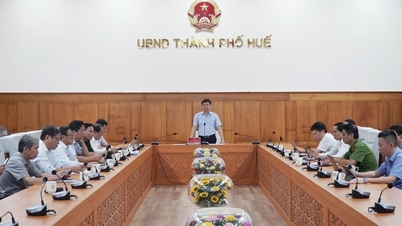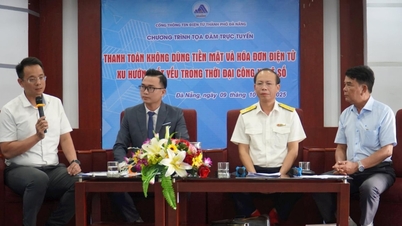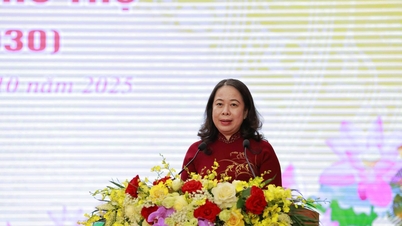
Identity set for National Digital Transformation Day 2025
New momentum from strategic vision
On April 22, 2022, the Prime Minister issued Decision No. 505/QD-TTg on National Digital Transformation Day, accordingly choosing October 10 of each year as National Digital Transformation Day.
Towards the celebration of Digital Transformation Day 2025, the Ministry of Science and Technology has announced the official identity for this year's event, reflecting the spirit of innovation, creativity and connection of a dynamic digital Vietnam.
At a recent regular press conference of the Ministry of Science and Technology, Mr. Le Anh Tuan, Deputy Director of the National Digital Transformation Agency, emphasized: "Digital transformation, along with science and technology, innovation, especially artificial intelligence (AI), is becoming a strong driving force shaping the future."
That viewpoint is concretized in Resolution 57-NQ/TW of the Politburo, identifying digital transformation as a strategic breakthrough; setting the target that by 2030, the digital economy will reach 30% of GDP and by 2045, it will reach 50% of GDP. The Government has implemented many programs and plans, most recently Resolution 71/NQ-CP on key tasks and solutions for developing the digital government, digital economy, and digital society.
2024 recorded many outstanding results: Vietnam's Digital Government ranking increased by 15 places, the rate of online applications reached nearly 40%; IT industry revenue reached VND 2,772 trillion (up 24%), hardware and electronics exports increased by 29%.
Digital infrastructure has also been strongly expanded: 99.3% of villages and hamlets have mobile broadband networks, mobile Internet speed reaches 146.64 Mbps (ranked 20th in the world), 5G coverage reaches 26%. Notably, 21.8 million digital certificates have been issued, along with 64 million VNeID accounts and 17.5 million chip-embedded citizen identification cards - the foundation for safe and convenient electronic transactions.
Currently, all ministries, branches and localities have issued and implemented the new phase of digital transformation plans according to the orientation of Resolution 57-NQ/TW. In particular, this resolution affirms: "Institutions are a prerequisite, need to be perfected and go one step ahead", making institutions a competitive advantage in science and technology development, innovation and digital transformation.
Digital institutions – the foundation for a creative and self-reliant Vietnam
Vietnam is aiming to not only “adapt” but also “catch up, keep up and surpass” in the digital age. To do so, drastic institutional action is urgently required.
Currently, the Government is urgently building a legal corridor for digital transformation, in which the draft Law on Digital Transformation drafted by the Ministry of Science and Technology is considered a fundamental step, creating a solid legal basis for the comprehensive digitalization process.
The National Digital Transformation Agency said that the draft Law has institutionalized the policy of defining digital transformation infrastructure as national strategic infrastructure, including digital infrastructure, public infrastructure and digital technology industry infrastructure. The State prioritizes budget investment and mobilizes social resources to modernize digital infrastructure in a synchronous, safe, sustainable and green direction, especially for projects with high socio-economic value.
The draft law also expands policies to support businesses in digital transformation. Costs for digital transformation are included in deductible expenses when determining taxable income for enterprises; at the same time, it encourages innovation, develops the "Make in Vietnam" digital platform and builds a healthy competitive environment, protecting consumers and workers on digital platforms.
These regulations will help reduce investment costs, especially for small and medium-sized enterprises, creating conditions to focus on research, innovation and improving labor productivity.
Regarding technology, the draft emphasizes the development and mastery of digital technology, prioritizing the leasing and purchasing of “Make in Vietnam” digital technology products and services in projects using the state budget. This is expected to be a driving force for Vietnamese enterprises to master core technology, creating “tailor-made” digital transformation solutions for Vietnam’s problems – more effective and sustainable.
With the institutional foundation being perfected, Vietnam expects to form three important pillars in the digital age.
Firstly, a creative, smart and distance-free State – where management and operational decisions are based on real-time data, supported by AI and data analysis. People and businesses are served by comprehensive, paperless, personalized public services according to their needs, creating a unified and friendly administration.
Second, a dynamic, competitive and autonomous digital economy – where data resources are opened up, creating a level playing field for all economic sectors. “Make in Vietnam” technology enterprises will confidently expand globally, while small and medium enterprises have the opportunity to participate in the digital value chain thanks to support policies and open infrastructure.
Third, a humane, inclusive and safe digital society – where people are at the center of the digital transformation process. Every citizen, whether in rural or urban areas, has access to basic digital skills, and has their privacy and data security protected. A culture of civilized and humane behavior is spread in cyberspace.
Notably, the draft Law devotes a chapter to regulating digital society, defining the principle of "taking people as the center" and ensuring the legitimate rights and interests of citizens in the digital environment.
Basic digital services such as electronic identity, digital signature, and electronic transaction accounts will be widely available; at the same time, there will be priority policies for children, people with disabilities, ethnic minorities, protecting children's rights and establishing a framework for civilized behavior in cyberspace.
This is an important foundation for building “digital trust” – a key factor that helps people and businesses confidently participate, contribute and benefit from the digital transformation process.
In the coming period, along with the implementation of tasks under Resolution 57-NQ/TW, the adoption and effective implementation of the Law on Digital Transformation will create a comprehensive legal corridor, ensuring that all people have the opportunity to access and enjoy the fruits of the digital age in a fair, safe and sustainable manner.
Thu Giang
Source: https://baochinhphu.vn/chuyen-doi-so-nhanh-hon-hieu-qua-hon-gan-dan-hon-102251009101634433.htm


![[Photo] President Luong Cuong attends the 80th Anniversary of the Traditional Day of Vietnamese Lawyers](https://vphoto.vietnam.vn/thumb/1200x675/vietnam/resource/IMAGE/2025/10/09/1760026998213_ndo_br_1-jpg.webp)

![[Photo] Prime Minister Pham Minh Chinh chairs a meeting of the Government Standing Committee on overcoming the consequences of natural disasters after storm No. 11](https://vphoto.vietnam.vn/thumb/1200x675/vietnam/resource/IMAGE/2025/10/09/1759997894015_dsc-0591-jpg.webp)


![[Photo] General Secretary To Lam visits Kieng Sang Kindergarten and the classroom named after Uncle Ho](https://vphoto.vietnam.vn/thumb/1200x675/vietnam/resource/IMAGE/2025/10/09/1760023999336_vna-potal-tong-bi-thu-to-lam-tham-truong-mau-giao-kieng-sang-va-lop-hoc-mang-ten-bac-ho-8328675-277-jpg.webp)































































































Comment (0)